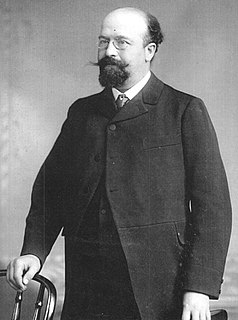A Quote by Murray Bookchin
I'm less influenced by any of [Karl] Marx's ideas today than I've ever been in my life, and most significantly Marx's theory of historical materialism, which I think is virtually a debris of despotism.
Related Quotes
After reading The Great Transformation by Karl Polanyi, I realized that capitalism did not naturally grow as [Karl] Marx would imply by his theory of historical materialism. People were dragged into capitalism screaming, shouting, and fighting all along the way, trying to resist this industrial and commercial world.
The Rulers of Russia, then, are Jewish Politicians, and they are applying to the world the doctrine of Karl Marx (Mordecai). Marx, was a clear and lucid Talmudist...full of that old Hebrew (sic) materialism which ever dreams of a paradise on earth and always rejects the hope held out of the chance of a Garden of Eden after Death.
To paraphrase Karl Marx, the great Karl Marx, a specter is haunting the streets of Copenhagen...Capitalism is the specter, almost nobody wants to mention it...Socialism, the other specter Karl Marx spoke about, which walks here too, rather it is like a counter-specter. Socialism, this is the direction, this is the path to save the planet, I don't have the least doubt. Capitalism is the road to hell, to the destruction of the world.
There's a sense in which Marx does contribute to the fund of human knowledge, and we can no more dismiss him than we can [George] Hegel or [Jean-Jacques] Rousseau or [Baruch] Spinoza or [Charles] Darwin; you don't have to be a Darwinian to appreciate Darwin's views, and I don't have to be a Marxist to appreciate what is valid in a number of [Karl] Marx's writings-and Marx would call that a form of simple commodity production rather than capitalism.
The two most far-reaching critical theories at the beginning of the latest phase of industrial society were those of Marx and Freud. Marx showed the moving powers and the conflicts in the social-historical process. Freud aimed at the critical uncovering of the inner conflicts. Both worked for the liberation of man, even though Marx's concept was more comprehensive and less time-bound than Freud's.
Most of Marx's predictions have failed to materialize, and his labor theory of value and other ideas have been proven wrong. Marx failed to recognize the incentive system built into the capitalist model - consumer choice and the profit motive of the entrepreneur. The irony is that capitalism, not socialism or Marxism, that has liberated the worker from the chains of poverty, monopoly, war, and oppression, and has better achieved Marx's vision of a millennium of hope, peace, abundance, leisure, and aesthetic expression for the 'full' human being.
Mr. Speaker, in 1848, Karl Marx said, a progressive income tax is needed to transfer wealth and power to the state. Thus, Marx's Communist Manifesto had as its major economic tenet a progressive income tax. Think about it, 1848 Karl Marx, Communism.... I say it is time to replace the progressive income tax with a national retail sales tax, and it is time to abolish the IRS, my colleagues. I yield back all the rules, regulations, fear, and intimidation of our current system.
Economy and ideology. The claim (presented as an essential postulate of historical materialism) that every fluctuation of politics and ideology can be presented and expounded as an immediate expression of the structure, must be contested in theory as primitive infantilism, and combated in practice with the authentic testimony of Marx, the author of concrete political and historical works.
It has taken me a long time to realize where I most disagree with Marx. His assessment of capitalism is far too favorable. He took its instability, inhumanity and irrationality to be signs that it was a merely transitional form, which had delivered into humanity's hands the means to a much better way of life than any that have ever existed on earth. Marx could not bring himself to believe that our species is so benighted, irrational and slavish that it would put up with such a monstrous way of life.
































